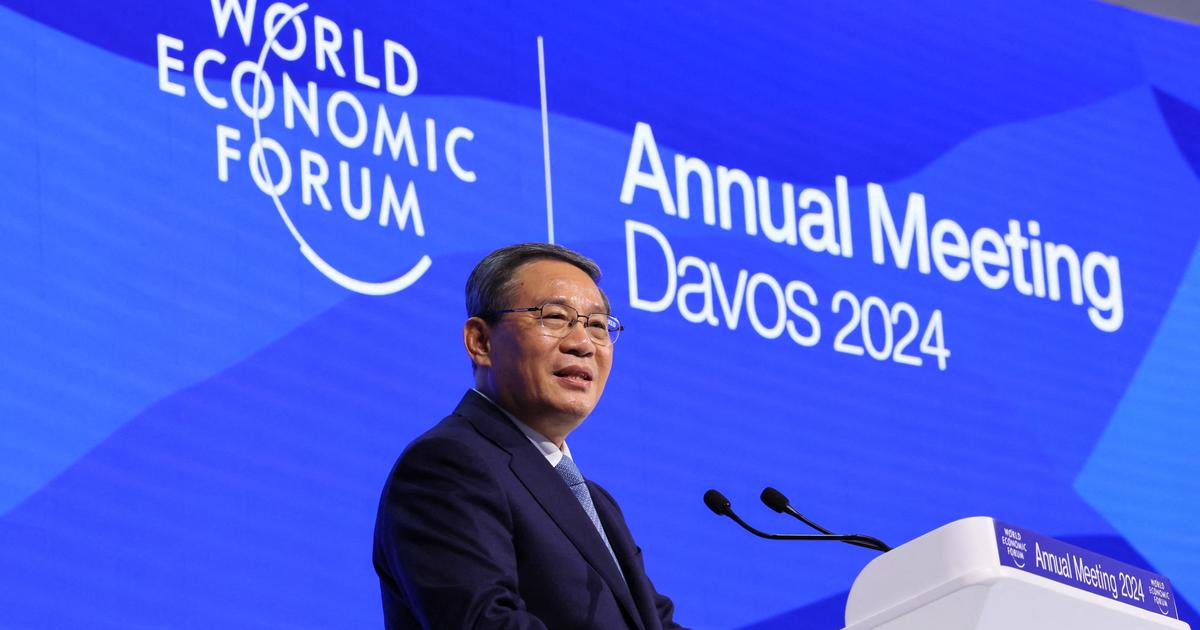Artificial intelligence (AI) is certainly the topic at the heart of all the conversations at the Davos Forum, the 54th edition of which began in earnest on Tuesday morning. Chinese Premier Li Qiang, who was expected to discuss his country's faltering economy and world affairs, also addressed the theme in his plenary speech to some 1500,19 participants. It was the first time a senior Chinese leader had spoken at this temple of globalization since the Covid-<> pandemic.
AI, the Chinese premier said, is "like a double-edged sword", "used wisely, it can bring (...) progress for industry, for science, but on the other side of the coin, it can pose problems in terms of safety and ethics." The Beijing hierarch was careful not to mention the massive use of facial recognition, which uses AI, which has been widely criticized in the West. "China believes that AI should serve the good of humanity." To this end, "there are red lines that must not be crossed, which must apply to all stakeholders". "Who should impose the rules?" asked Li Qiang. "If they are set by a few countries, we cannot speak of multilateralism," he said, invoking the UN Charter.
Read alsoThe Davos Forum, an Alpine refuge from a shaken globalization
Von der Leyen calls for 'responsible use of AI'
Was this an allusion to the European Union, which has just legislated on AI? The President of the European Commission, Ursula von der Leyen, succeeded Li Qiang on stage in the main plenary hall, but did not cross paths with him. She recalled that the EU, with its Artificial Intelligence Act, has been a pioneer in the world in terms of AI regulation. "An example of how democracy and business can strengthen each other," added "VDL", a Davos regular. The head of the EU executive referred to the World Economic Forum's Global Risks Report, published last week as a curtain raiser to the Davos summit, which puts disinformation at No. 1 risk. And this is all the more threatening because it is facilitated by AI tools. "Mind you, I'm optimistic about technology, as a doctor by training, I know that AI has already generated a revolution in medicine and can boost productivity," she said. This does not prevent him from advocating for "a responsible use of AI in the service of society".
In order not to be left behind by the American tech giants, almost all of whose bosses are at the Davos Forum, Ursula von der Leyen spoke of the EU's strengths. According to her, Europe has 200,000 computer engineers specialising in AI, "more than China or the United States". The EU will provide European start-ups with "supercomputers" as well as access to data.
Read alsoMacron at the Davos Forum on Wednesday to meet with major foreign bosses
China's economic slowdown downplayed
Beyond AI, the Chinese premier of course spoke about the economy of the world's second-largest power. To put China's slowing growth into perspective, he advised "taking a step back", as one does when looking at the peaks of the Alps, to no longer see only the ripples and peaks, but to have a "panoramic view". Li Qiang advocated multilateralism, in line with Xi Jinping's speech in Davos in January 2017. The Red Emperor, speaking a few days before Donald Trump's inauguration, presented himself as a champion of free trade and cooperation, triggering rounds of applause from the CEOs of the world's largest companies.
On Tuesday, Ursula von der Leyen, the president of the European Commission, wanted to show that Europeans are no longer naïve. Recalling that China is "one of our biggest partners", "VDL" recalled that it did not want to "decouple" the two economies but to "de-risk". It advocates for fair access to markets and for reducing excessive dependencies. This seems to contradict Li Qiang's proposal, made a few minutes before, to "strengthen the specialization" of countries. It is precisely because China has specialised, for example in the entire graphite value chain, that Europe finds itself tied hand and foot in the face of Chinese suppliers who hold a virtual global monopoly on this strategic mineral. Ursula von der Leyen has explicitly criticised Beijing's control of its exports of two metals critical to the energy transition, gallium and germanium. In the temple of happy globalization and multilateralism that is the Davos Forum, which this year has chosen as its slogan "rebuilding trust", it was clear that there is still a long way to go to restore it.

